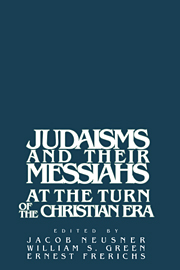Book contents
- Frontmatter
- Contents
- Preface
- List of Contributors
- 1 Introduction: Messiah in Judaism: Rethinking the Question
- 2 Wisdom Makes a Difference: Alternatives to “Messianic” Configurations
- 3 Salvation without and with a Messiah: Developing Beliefs in Writings Ascribed to Enoch
- 4 How the Authors of 1 and 2 Maccabees Treated the “Messianic” Promises
- 5 Messianism in the Maccabean Period
- 6 Waiting for the Messiah: The Spiritual Universe of the Qumran Covenanters
- 7 Philo and Messiah
- 8 Messiah and Gospel
- 9 Christology in Mark's Gospel
- 10 The Question of the Messiah in 4 Ezra
- 11 From Jewish Messianology to Christian Christology: Some Caveats and Perspectives
- 12 Mishnah and Messiah
- General Index
- Index to Biblical and Hermeneutical Texts
12 - Mishnah and Messiah
Published online by Cambridge University Press: 08 January 2010
- Frontmatter
- Contents
- Preface
- List of Contributors
- 1 Introduction: Messiah in Judaism: Rethinking the Question
- 2 Wisdom Makes a Difference: Alternatives to “Messianic” Configurations
- 3 Salvation without and with a Messiah: Developing Beliefs in Writings Ascribed to Enoch
- 4 How the Authors of 1 and 2 Maccabees Treated the “Messianic” Promises
- 5 Messianism in the Maccabean Period
- 6 Waiting for the Messiah: The Spiritual Universe of the Qumran Covenanters
- 7 Philo and Messiah
- 8 Messiah and Gospel
- 9 Christology in Mark's Gospel
- 10 The Question of the Messiah in 4 Ezra
- 11 From Jewish Messianology to Christian Christology: Some Caveats and Perspectives
- 12 Mishnah and Messiah
- General Index
- Index to Biblical and Hermeneutical Texts
Summary
The Mishnah in the Context of Earlier Uses of the Messiah Theme
When the Temple of Jerusalem fell to the Babylonians in 586 b.c.e., Israelite thinkers turned to the writing of history to explain what had happened. From that time onward, with the composition of the Pentateuch and the historical books, Joshua, Judges, Samuel, and Kings, to teach the lessons of history, and of prophetic and apocalyptic books to interpret and project those lessons into the future, Israel explained the purpose of its being by focusing upon the meaning of events. The critical issue then was salvation: From what? For what? By whom? In that context, the belief in a supernatural man, an anointed savior or Messiah, formed a natural complement to a system in which teleology took the form of eschatology. Israelites do their duty because of what is happening and of where events will lead. All things point to a foreordained end, presenting the task of interpreting the signs of the times. No wonder, then, that when the Temple of Jerusalem fell to the Romans in c.e. 70, established patterns of thinking guided writers of Judaic apocalypse to pay attention to the meaning of history. In that setting, Jesus, whom Paul had earlier grasped in an essentially a historic framework, now turned out, in the hands of the writers of the Gospels, to be Israel's Messiah. He was the Messiah at the end of time, savior and redeemer of Israel from its historical calamity, thus a historical-political figure: king of the Jews.
- Type
- Chapter
- Information
- Judaisms and their Messiahs at the Turn of the Christian Era , pp. 265 - 282Publisher: Cambridge University PressPrint publication year: 1988



